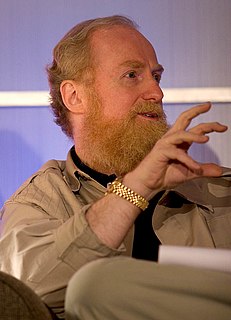A Quote by Bran Ferren
One of the great enemies of design is when systems or objects become more complex than a person - or even a team of people - can keep in their heads. This is why software is generally beneath contempt.
Related Quotes
As we build systems that are more and more complex, we make more and more subtle but very high-impact mistakes. As we use computers for more things and as we build more complex systems, this problem of unreliability and insecurity is actually getting worse, with no real sign of abating anytime soon.
One can expect the human race to continue attempting systems just within or just beyond our reach; and software systems are perhaps the most intricate and complex of man's handiworks. The management of this complex craft will demand our best use of new languages and systems, our best adaptation of proven engineering management methods, liberal doses of common sense, and a God-given humility to recognize our fallibility and limitations.
In order to survive, all systems must evolve by providing greater and greater access to the currents that flow through them. This applies to all physical, biological and social systems that survive and thrive.... But let’s take that one step forward... the systems just described are ... constantly evolving. This suggests another design principle: ... design for evolution rather than creating a static design optimizing for the present.
The machines that are first invented to perform any particular movement are always the most complex, and succeeding artists generally discover that, with fewer wheels, with fewer principles of motion, than had originally been employed, the same effects may be more easily produced. The first systems, in the same manner, are always the most complex.
O loss of sight, of thee I most complain! Blind among enemies, O worse than chains, dungeon or beggary, or decrepit age! Light, the prime work of God, to me is extinct, and all her various objects of delight annulled, which might in part my grief have eased. Inferior to the vilest now become of man or worm; the vilest here excel me, they creep, yet see; I, dark in light, exposed to daily fraud, contempt, abuse and wrong, within doors, or without, still as a fool, in power of others, never in my own; scarce half I seem to live, dead more than half.
Molecular biology has shown that even the simplest of all living systems on the earth today, bacterial cells, are exceedingly complex objects. Although the tiniest bacterial cells are incredibly small, weighing less than 10-12 gms, each is in effect a veritable micro-miniaturized factory containing thousands of exquisitely designed pieces of intricate molecular machinery, made up altogether of one hundred thousand million atoms, far more complicated than any machine built by man and absolutely without parallel in the nonliving world.
The engineering, analytics, design, testing, and delivery behind our products offer some of the hardest engineering and business challenges in the world. As we've brought our franchises into eSports and moved to digital delivery, it's become even more complex and exciting - which, in turn, has allowed us attract even more top talent.





































